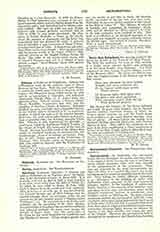

Sacramentals.—In instituting the sacraments Christ did not determine the matter and form down to the slightest detail, leaving this task to the Church, which should determine what rites were suitable in the administration of the sacraments. These rites are indicated by the word Sacramentalia, the object of which is to manifest the respect due to the sacrament and to secure the sanctification of the faithful. They belong to widely different categories, e.g.: substance, in the mingling of water with Eucharistic wine; quantity, in the triple baptismal effusion; quality, in the condition of unleavened bread; relation, in the capacity of the minister; time and place, in feast-days and churches; habit, in the liturgical vestments; posture, in genuflexion, prostrations; action, in chanting etc. So many external conditions connect the sacramentals with the virtue of religion, their object being indicated by the Council of Trent (Sess. XXII, 15), that it is asserted that apart from their ancient origin and traditional maintenance ceremonies, blessings, lights, incense etc. enhance the dignity of the Holy Sacrifice and arouse the piety of the faithful. Moreover the sacramentals help to distinguish the members of the Church from heretics, who have done away with the sacramentals or use them arbitrarily and with little intelligence.
Sacramental rites are dependent on the Church which established them, and which therefore has the right to maintain, develop, modify, or abrogate them. The ceremonial regulation of the sacraments in Apostolic times is sufficiently proved by the words of St. Paul to the Corinthians with regard to the Eucharist: “Cetera autem, cum venero, disponam” [the rest I will set in order when I come (I Cor., xi, 34)], which St. Augustine, on what ground we know not, supposes to refer to the obligation of the Eucharistic fast (Ep. liv, “Ad Januarium”, c. 6, n. 8, in P.L., XXXIII, 203). The Fathers of the Church enumerate ceremonies and rites, some of which were instituted by the Apostles, others by the early Christians (cf. Justin Martyr, “Apol. I”, n. 61, 65 in P.G., VI, 419, 427; Tertullian, “De baptismo”, vii in P.L., I, 1206; St. Basil, “De Spiritu Sancto”, I, xxvii, n. 67 in P.G., XXXII, 191). The Catholic Church, which is the heiress of the Apostles, has always used and maintained against heretics this power over sacramentals. To her and to her alone belongs the right to determine the matter, form, and minister of the sacramentals. The Church, that is, the supreme authority represented by its visible head, alone legislates in this matter, because the bishops no longer have in practice the power to modify or abolish by a particular legislation what is imposed on the universal Church. What concerns the administration of the sacraments is contained in detail in the Roman Ritual and the Episcopal Cieremoniale.
Apart from the ceremonies relating to the administration of the sacraments the Church has instituted others for the purpose of private devotion. To distinguish between them, the latter are named sacramentals because of the resemblance between their rites and those of the sacraments properly so-called. In ancient times the term sacrament alone was used, but numerous confusions resulted and the similarity of rites and terms led many Christians to regard both as sacraments. After Peter Lombard the use and definition of the word “sacramental” had a fixed character and was exclusively applicable to those rites presenting an external resemblance to the sacraments but not applicable to the sensible signs of Divine institution. St. Thomas Aquinas makes use of the terms sacra and sacramentalia (Summa I-II, Q. cviii, a. 2, ad gum; III, Q. lxv, a. 1, ad 8um), which the theologians of a later period adopted, so that at present sacramentalia is exclusively reserved for those rites which are practiced apart from the administration of the seven sacraments, for which the word ceremonies is used.
The number of the sacramentals may not be limited; nevertheless, the attempt has been made to determine their general principles or rather applications in the verse: “Orans, tinctus, edens, confessus, dans, benedicens”. Orans indicates public prayer, whether liturgical or private; tinctus, the use of holy water and the unctions in use at various consecrations; edens, the eating of blessed foods; confessus, the general avowal of faults which is made in the Confiteor recited at Mass, at Communion, in the Divine Office; dans, alms; benedicens, papal and episcopal blessings etc., blessings of candles, ashes, palms etc. Another distinction classifies sacramentals according to whether they are acts, e.g. the Confiteor mentioned above, or things, such as medals, holy water etc. The sacramentals do not produce sanctifying grace ex opere operato, by virtue of the rite or substance employed, and this constitutes their essential difference from the sacraments. The Church is unable to increase or reduce the number of sacraments as they were instituted by Christ, but the sacramentals do not possess this dignity and privilege. Theologians do not agree as to whether the sacramentals may confer any other grace ex opere operantis through the action of the one who uses them, but the negative opinion is more generally followed, for as the Church cannot confer sanctifying grace nor institute signs thereof, neither can she institute efficacious signs of the other graces which God alone can give. Moreover, as experience teaches, the sacramentals do not infallibly produce their effect. Finally in the euchologic formulas of the sacramentals the Church makes use, not of affirmative, but of deprecatory expressions, which shows that she looks directly to Divine mercy for the effect.
Besides the efficacy which the sacramentals possess in common with other good works they have a special efficacy of their own. If their whole value proceeded from the opus operantis, all external good works could be called sacramentals. The special virtue recognized by the Church and experienced by Christians in the sacramentals should consist in the official prayers whereby we implore God to pour forth special graces on those who make use of the sacramentals. These prayers move God to give graces which He would not otherwise give, and when not infallibly acceded to it is for reasons known to His Wisdom. God is aware of the measure in which He should bestow His gifts. All the sacramentals have not the same effect; this depends on the prayer of the Church which does not make use of the same urgency nor have recourse to the same Divine sources of merit. Some sacramentals derive no special efficacy from the prayer of the Church; such are those which are employed in worship, without a blessing, or even with a blessing which does not specify any particular fruit. This is the case with the blessing of vessels meant to contain the holy oils: “Give ear to our prayers, most merciful Father, and deign to bless and sanctify these purified vessels prepared for the use of the sacred ministry of Thy Church“. On the other hand, some sacramentals, among them one of those most frequently used, holy water, are the object of a benediction which details their particular effects.
One of the most remarkable effects of sacramentals is the virtue to drive away evil spirits whose mysterious and baleful operations affect sometimes the physical activity of man. To combat this occult power the Church has recourse to exorcism and sacramentals. Another effect is the delivery of the soul from sin and the penalties therefor. Thus in the blessing of a cross the Church asks that this sacred sign may receive the heavenly blessing in order that all those who kneel before it and implore the Divine Majesty may be granted great compunction and a general pardon of faults committed. This means remission of venial sins, for the sacraments alone, with perfect contrition, possess the efficacy to remit mortal sins and to release from the penalties attached to them. St. Thomas is explicit on this point: “The episcopal blessing, the aspersion of holy water, every sacramental unction, prayer in a dedicated church, and the like, effect the remission of venial sins, implicitly or explicitly” (Summa III, Q. lxxxvii, a. 3, ad lum). Finally the sacramentals may be employed to obtain temporal favors, since the Church herself blesses objects made use of in every-day life, e.g. the blessing of a house on which is called down the abundance of heavenly dew and the rich fruitfulness of the earth; so likewise in the benediction of the fields, in which God is asked to pour down His blessings on the harvests, so that the wants of the needy may be supplied by the fertile earth.
H. LECLERCQ


